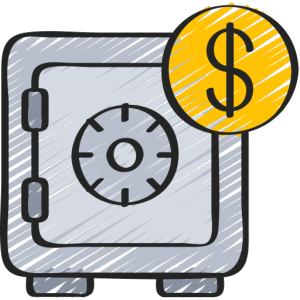Can you really make a living from as an Active Trader from Day Trading?
Can you live off day trading in the stock market? Anyone who deals with the stock market beyond hobby will sooner or later deal with the question. In the following article, we would like to look from several sides and try to separate emotions and facts. To the extent that there is a basis for continuing this thought. Of course, such a decision is always a very personal one, because it sets the course for the long term. Especially in connection with the topic of “trading”. In fact, reality and expectations are sometimes further apart. That is why it is important to compare the pros and cons.
Factors, as a necessary prerequisite, when making decisions as an active trader

active trader
Let’s talk about money first. The key question is: how much capital do you need to make a living from trading?
This is where the fiercest discussions ignite. But the question is in the wrong place. Because the amount of capital is not the crucial question, at least this is not the first question. It is much more important to clarify the following points before making a decision:
- Which trading strategy should I use?
- What skills, knowledge and experience do I need?
- In which market and with which investment products should I trade?
- How much capital do we need to cover all necessary living costs, including the necessary insurance and the establishment of a corresponding pension plan (taking all tax aspects into account)?
If these questions not answered or result in unsatisfactory answers, even a larger trading capital will not help you to survive. A lack of preparation for this important development step cannot be compensated for by maintaining a larger starting sum. This would only postpone the time of failure, but could hardly stop the inevitable end.
I have answered the above questions for myself. I am only expressing my personal opinion and attitude and thus not claiming the “absolute truth”):
Which trading strategy should I use?
Over the years in which I was working with day traders, I discovered that short-term trading (intraday trading) was the right trading style for me. It wasn’t that I was assigned an area, but it emerged over the years that I achieved my steadiest trading results in this time period. This period suits me because it closely matches my “trading and valuation philosophy” of the markets. I take the view that markets are reflexive and that this of course also applies to price movements.
I need an approach that gives me a calculable risk, a simple set of rules, and a stable, long-term applicability. Gives the opportunity for regular income. I want to be able to calculate every single day, never be a slave to my position, and do not wallow in uncertainty and erroneous hopes for long positions. I have the common trading approaches through – position trading, swing trading, long, short term, and very short day trading, and I got stuck with the latter years ago. All the requirements that I personally place on “my trading style” are met here.
What skills, knowledge and experience do I need?
 I learned the craft of “trading” from the bottom up. But that doesn’t change the fact that everyone can learn it. Doing so without mastering the craft of trading is dangerous nonsense and a huge overestimation of yourself. You risk not only your money and your large foundation, but also that of your family. Nobody would think of pursuing a profession without any training – be it a craft or an academic profession. It is even punishable to pursue certain professional activities if you do not have the relevant training, such as a doctor or lawyer.
I learned the craft of “trading” from the bottom up. But that doesn’t change the fact that everyone can learn it. Doing so without mastering the craft of trading is dangerous nonsense and a huge overestimation of yourself. You risk not only your money and your large foundation, but also that of your family. Nobody would think of pursuing a profession without any training – be it a craft or an academic profession. It is even punishable to pursue certain professional activities if you do not have the relevant training, such as a doctor or lawyer.
Advanced knowledge acquisition, without which a step into a desired independence as a trader is a game with fire, only makes sense if you find a source that supports you in every way and whose knowledge you know can soak up.
I am convinced that you will get familiar with your software, and the trading rules you use if you start with simulated trading. Do not start with real money straight away! Forget the most common counter-arguments that trading in “play money” lacks the “real kick”. This is not about “excitement” and “action”! It is about achieving steady yields, developing them with little volatility.
How many trades do traders make each day?
It all depends on your market. Some days you can make as many trades as you can imagine other days it is better to stay on the sidelines and don’t act at all. I saw traders who make hundreds of trades a day as well as no trades on some days.
In which market and with which investment products should I trade as an active trader?
The choice of the right market and the right product depends on your preferred trading style or set of rules. To do this, you have to deal with the products in question and fully understand their functioning and trading methods. I have emphasized this on many occasions: every trading style has its suitable product. If you mix this, it would be comparable to want to screw in a screw with a nail file.
If you want to focus on short-term trading like day trading, you trade highly liquid markets Forex, futures markets. These bring the necessary liquidity and volatility. It makes sense to focus on one market, at most two markets. This is the only way you can really get to know it, understand the thinking and trading style of the other players. Learn to read your market between the lines.
How much capital do we need to cover all necessary living costs?

how much capital
You have to make a living and earn enough capital. Can you live off day trading in the stock market? To pay rent, utilities, insurance, groceries, clothing, and everything else on a regular basis. You have to take into account that you will not always have good trading days. Losing streak can slide. As far as possible, this does not have to be covered by existing reserves, but must be secured by reserves formed in the trade.
So very important here: The goal is always to take the surpluses out of trading to:
- cover the costs
- build up reserves
The reserves are not reinvested in trading, but are invested as conservatively and securely as possible. The reserves are not about another pot to generate a return. This is only and only about security, security, and security again. Your trading capital remains at the calculated margin.
Subjective factors to consider when making decisions:
- Do you have a realistic idea of what it means to have to survive every day in a market of uncertainty?
- Are you ready to put a lot of work, time, and effort into trading?
- How is your family? What do your spouse, partner say about this? Are all of these behind you?
- You could certainly raise other questions, but I think it should cover some key points
What are the most common cliché about trading and rules of an active trader?
Money and free time without end. That you can live from the stock market with a few quick clicks. That was very exaggerated, but that is how trading life is often described. The fact is that the fruits hang very high. It is not the final trade that makes it difficult to “pick” the fruits. It is a lack of knowledge, a lack of skill, a lack of discipline – all together.
You will spend a lot of time in front of the computer and you will also sit in front of it hour after hour without coming into the market. And you have to be disciplined enough not to go into action and to a trade. You need a healthy attitude towards losses. We don’t sit out, we act and free ourselves from the burden of wrong trades. You have to be able to evaluate yourself as an external third party at any time. You keep your performance list with you every day and analyze your wrong trades every day. You have clear risk limits for the day, for the week, for the month. An evening trading diary is a matter of course for you. In addition, (in my personal experience) it makes a lot of sense to look for an online trader community, a blog, or forums. It makes sense to ask: What is the best forums website for stock day traders? There are few: elite trader, futures.io, some good Reddit sub-reddits are investing, trading, wsb.
It is always important to remember: you are trading with your family’s money, ie your family bears losses. Talk through everything in advance with your spouse and life partners, let them take part in your plans, your “business plan”. I speak from my own experience when I postulate that a strong “partnership” forms the basis for acting. Trading in itself is a powerful stress and test for you and your family.
In conclusion: for me personally, this is the most exciting, challenging, and inspiring endeavor you can face in your career.
There are no hypocrisy and mismatches as in other professions. You get rewarded for your performance and punished for your mistakes. And maybe that’s exactly what trading can make living fun.
Good luck with your trading and remember: enjoy your life and loved ones!

Active Trader






0 Comments